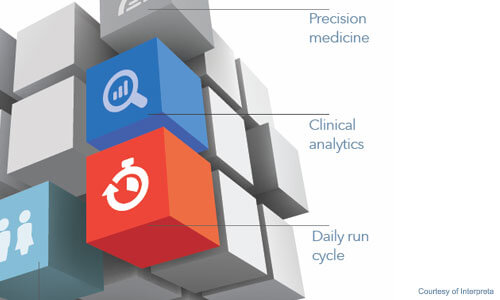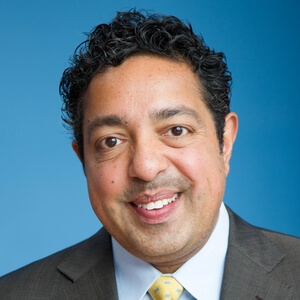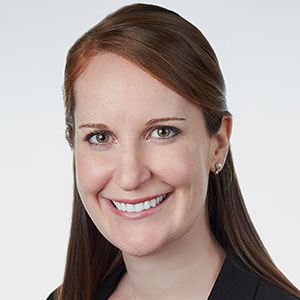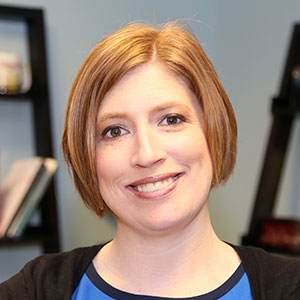Session Abstract – PMWC 2017 Silicon Valley
Session Synopsis:
Many precision medicine initiatives at medical centers, foundations, and providers are aggregating vast amounts of data (e.g. genomics, clinical, and EMR data). Challenges and bottlenecks to overcome are associated with the data generation and aggregation process, and knowledge extraction from multi-modular healthcare data. Representatives from different organizations will discuss specific approaches and learnings.
Session Chair Profile
M.D., Ph.D., Director, Institute for Computational Health Sciences, UCSF
Biography
Atul Butte, MD, PhD is the new Director of the new Institute of Computational Health Sciences (ICHS) at the University of California, San Francisco, and a Professor of Pediatrics. Dr. Butte trained in Computer Science at Brown University, worked as a software engineer at Apple and Microsoft, received his MD at Brown University, trained in Pediatrics and Pediatric Endocrinology at Children’s Hospital Boston, then received his PhD from Harvard Medical School and MIT. Dr. Butte has authored nearly 200 publications, with research repeatedly featured in Wired Magazine, the New York Times, and the Wall Street Journal. In 2013, Dr. Butte was recognized by the White House as an Open Science Champion of Change for promoting science through publicly available data. Dr. Butte is also a founder of three investor-backed data-driven companies: Personalis, providing clinical interpretation of whole genome sequences, Carmenta (acquired by Progenity), discovering diagnostics for pregnancy complications, and NuMedii, finding new uses for drugs through open molecular data. Dr. Butte is also the principal investigator of ImmPort, the clinical and molecular data repository for the National Institute of Allergy and Infectious Diseases.
Talk
Driving Disease Understanding and Treatment via a Centralized Data Warehouse
Aggregating and integrating large amount of data generated at different medical centers will help advance basic disease research and will add to the understanding of effective therapeutic approaches. Building and maintaining a platform and data warehouse that enables researchers to access the data is a prerequisite to advance health care.
Speaker Profile
Ph.D., Associate Director, Precision Medicine Initiatives, GNS Healthcare, Inc.
Biography
Dr. Diane Wuest develops strategic relationships with precision medicine partners to develop and commercialize computer models capable of elucidating disease mechanisms, advancing drug discovery and development, and improving patient care. Diane manages ongoing alliances and leverages internal analytic and product development teams to implement company-wide initiatives. Prior to GNS Healthcare, Diane worked at Genentech and obtained a Ph.D. in chemical and biomolecular engineering from the University of Delaware. Diane holds a B.S. in chemical engineering from Cornell University.
Talk
Unlocking Precise Knowledge within Complex Data via Causal Machine Learning
Causal machine learning approaches generate disease models from multimodal datasets (‘omics, clinical, medical, claims, EHR, registries, etc.) and enable personalized, actionable predictions and precision targeting of interventions. Simulations, or “what if” questions, of the unbiased models identify what factors cause patient responses to treatments and identify biomarkers and drivers of disease for therapeutic discovery and implementation.
Speaker Profile
MS, Ph.D., Director & Chief Research Informatics Officer, Geisinger Health System
Biography
Dr. Ritchie is a statistical and computational geneticist with a focus on understanding genetic architecture of complex human disease. She has expertise in developing novel bioinformatics tools for complex analysis of big data in genetics, genomics, and clinical databases, in particular in the area of Pharmacogenomics. Dr. Ritchie has received several awards and honors including selection as a Genome Technology Rising Young Investigator in 2006, an Alfred P. Sloan Research Fellow in 2010, and a KAVLI Frontiers of Science fellow by the National Academy of Science from 2011-2014. Dr. Ritchie has extensive experience in all aspects of genetic epidemiology and translational bioinformatics as it relates to human genomics. She also has extensive expertise in dealing with big data and complex analysis including GWAS, next-generation sequencing, CNVs, data integration of meta-dimensional omics data, Phenome-wide Association Studies (PheWAS), and development of data visualization approaches.
Talk
Defining Disease in a Vast Sea of Phenotypes
Identifying gene-disease relationships is paramount for making discoveries and leading to improved understanding of disease etiology and development of novel treatment and prevention strategies. Through the use of extensive electronic health records data, we have begun to explore the complex relationships between disease phenotypes to improve our precision medicine research initiatives.






